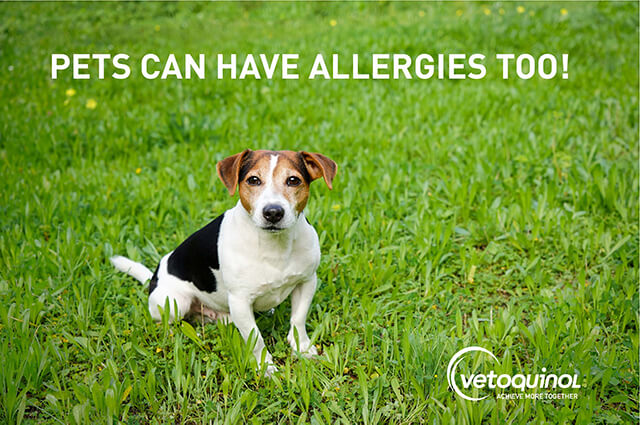HOW ENVIRONMENTAL ALLERGIES CAN AFFECT YOUR DOG OR CAT
Allergies are one of the top reasons that dogs and cats end up going to see their veterinarian. Some of the most commonly diagnosed allergens are environmental and include pollens (grass, tree, or weed), mould spores, mildews, and dust mites.
When trying to diagnose the problem, it is important to make sure that other conditions are not the main cause or at least contributing concurrently to your pet’s symptoms. Other medical issues can cause similar symptoms as allergens and it is important to make the correct diagnosis. Your veterinarian’s experience can help them rule out other conditions that can cause the same types of symptoms as environmental allergies. A good timeline and history of when the signs first started, the seasons when your pet tends to exhibit these signs each year, when the signs are at their absolute worst, etc. can assist your veterinarian tremendously in making a proper diagnosis. In addition to the detailed history that you can provide to your veterinarian, a physical exam and some basic tests (skin cytology, skin scrapings, etc.) are necessary to rule out other potential causes of your pet’s symptoms.
Once there is a strong suspicion that environmental allergies are the main cause of the symptoms, the gold standard for diagnosing patients with environmental allergies is to do an allergy test – an intradermal skin test is typically preferred, but a blood test for environmental allergies is an alternative option. This testing will help identify which specific substances your pet is allergic to. From here, the most recommended treatment is giving hypo-sensitisation injections or “allergy shots”. These shots are typically given once weekly with the concentration gradually increased over time. These injections can decrease the body’s inflammatory response to the allergens, which means less inflammation, less itchiness, and a better quality of life.
Beyond hypo-sensitisation allergy injections, there are other medications that can be of benefit for allergic patients. It is important to differentiate that allergy shots go directly to the root of the problem, while some of these other options may only help to temporarily alleviate the signs and symptoms associated with the underlying allergies. Nonetheless, these other treatments can play an important role when used periodically in conjunction with allergy shots or if allergy shots are not pursued:
Fish oil supplementation (Omega 3 fatty acids, which are safe to use long term)
Regular bathing (maintenance shampoo or a medicated shampoo if secondary problems such as skin infection are present)
Antihistamines
Steroids
Other itch/inflammation blocking medications prescribed by your veterinarian
Environmental allergies are a common problem. Your veterinarian is a wealth of information and they can help you determine the best way to deal with your pet’s individual situation. If you have a pet exhibiting frequent skin issues, ear issues, itchiness, etc. then a consultation with your veterinarian is important to discuss these issues. If necessary, your veterinarian can refer you to a Veterinary dermatologist for further evaluation.



